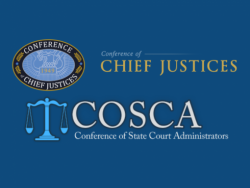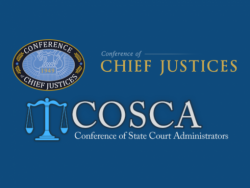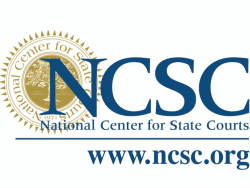Document Author
Topic
- (-) Remove 100% Access to Justice filter 100% Access to Justice
- (-) Remove CCJ/COSCA Leadership filter CCJ/COSCA Leadership
- Allied Professionals (1) Apply Allied Professionals filter
- Best Practices (1) Apply Best Practices filter
- Best Practices for Self-Help Centers (1) Apply Best Practices for Self-Help Centers filter
- Courts (1) Apply Courts filter
- Human Centered Design (1) Apply Human Centered Design filter
- Integration with Institutional Process (1) Apply Integration with Institutional Process filter
- Justice Tech Entrepreneurs (1) Apply Justice Tech Entrepreneurs filter
- Linking a Self-Help Center to Other Services (1) Apply Linking a Self-Help Center to Other Services filter
- Remote (1) Apply Remote filter
- Reports, Evaluations, Best Practices, Surveys (1) Apply Reports, Evaluations, Best Practices, Surveys filter
- Research (1) Apply Research filter
- Scaling in Court Systems (1) Apply Scaling in Court Systems filter
- Self-Help Centers (1) Apply Self-Help Centers filter
- Strategic Planning (1) Apply Strategic Planning filter
- Technology (1) Apply Technology filter
- Trial Court Self-Help (1) Apply Trial Court Self-Help filter
State
Tags
Post date
Search results

Resolution: In Support of Continuing Efforts to Meet Civil Legal Needs (CCJ/COSCA 2021)
In February of 2021, the Conference of Chief Justices and the Conference of State Court Administrators adopted Resolution 2 In Support of Continuing Efforts to Meet Civil Legal Needs. After extensive findings setting out the need, especially during the CO ...

Resource: Guiding Principles for Post-Pandemic Court Technology (CCJ/COSCA 2020)
The Conference of Chief Justices (CCJ) and Conference of State Court Administrators (COSCA) published these Guiding Principles for Post-Pandemic Court Technology on July 16, 2020 with the goal to better guide state courts as they moved services to remote ...

Paper: A Case for Court Governance Principles (Becker and Durham 2010)
State courts have had ample reasons for questioning the continued viability of traditional approaches to organizing their work and to providing leadership. This paper proposed a set of principles for governing state court systems that was intended to prov ...